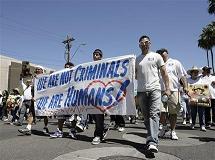Immigrants in New York City have a lower unemployment rate and participate in the labor force at a higher rate than native-born Americans, a divergence from the national trends that may reflect optimism about the recovery.The economic recession didn’t hit New York City as badly as other parts of the country. The city lost proportionally fewer payroll jobs than the nation as a whole.
A report by the Fiscal Policy Institute, a think tank, shows that in the first five months of 2010 the unemployment rate for immigrants in New York City was 8.8 percent while the rate for native-born residents was 10.9 percent. The city average was 9.9 percent.”When employers see the light at the beginning of the recovery, when they begin hiring again, the first kind of worker they seek will likely be expendable,” said Demetrios Papademetriou, president of the Migration Policy Center in Washington.
“New York has always relied on immigrants, and new immigrants, to drive its economy,” he said.Labor participation rates of U.S.-born New Yorkers declined from 59.2 percent in 2008 to 57.1 percent in 2010, while that of immigrant residents rose from 60 percent to 64.1 percent in the same period, the study said.
Labor participation is defined by those employed plus those actively looking for work.”Immigrant labor force participation in New York goes up during the recession, underscoring the notion that as the economy worsens, immigrants are more increasingly looking for work to cover their needs,” said David Dyssegaard Kallick, senior fellow at the Fiscal Policy Institute who authored the report.
Kallick measured immigrants’ employment, regardless of their legal status, using five months of data from the Bureau of Labor Statistics and the Census Bureau.Immigrants laborers are more likely to relocate in pursuit of work, and without access to unemployment insurance many more quickly accept undesirable and temporary jobs.
“We see people coming from towns in Michigan, from Wisconsin, from North Carolina,” said Cirilo Gonzalez, 50, who works on indoor construction, primarily installing drywall.Oscar Hernandez, 39, moved to the United States 12 years ago from the central Mexican state of Morelos, and said labor conditions in New York push some immigrant workers to New Jersey or Philadelphia.”Seven dollars an hour is bad but it’s better than nothing,” Hernandez said. “My family is waiting for food.”(Reuters)


